First Job
My first position with the Central Intelligence Agency was as a political analyst. The official CIA website describes analysis jobs as:
“Collaborative. Problem-solvers. Critical thinkers. These are the qualities needed for CIA analytic positions. The ability to study and evaluate sometimes inconsistent and incomplete information and provide unique insights that help inform decisions.”
The website offers more about being a political analyst at CIA:
“You will support policymakers by producing and delivering written and oral assessments of the domestic politics, foreign policy, stability, and social issues of foreign governments and entities. Your analysis will examine these actors’ goals and motivations, culture, values, history, society, decision making processes, and ideologies in the context of how those elements affect US interests and national security.”
In short, you are solving puzzles. Complex, ill-defined, and hidden puzzles.
For the first five years of my career, I did just that. It was a terrific introduction to not only the US intelligence community and US military but also to the challenges of international diplomacy.
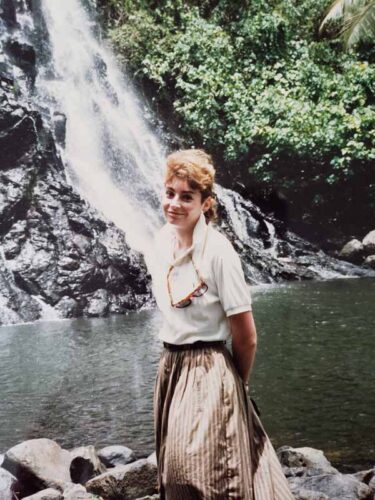
In the South Pacific, circa 1988
Information from multiple sources crossed my desk. I had to sift through the details to find patterns and motivations. Sometimes key details were there and clear as a bell. Those times were rare.
Mostly, the puzzle pieces didn’t fit together. The story was murky and incomplete. You always wanted more and better pieces.
Related post: Wordsmithing at CIA
Former CIA Director (and Secretary of Defense) Leon Panetta, writing in WORTHY FIGHTS, put it this way:
“In the real world of intelligence . . . breakthroughs are the result of patient and resolute work, the slow accumulation of facts, each of which may seem ambiguous but that collectively add up to a hypothesis.”
Teamwork
Teamwork was imperative. Not only do teams of CIA analysts work together on a problem or a publication, but analysts work with those in other agencies.
Analysts connect with counterparts in other government agencies and the military, consulting and often collaborating.
I became close friends with a State Department officer who made baby quilts when my children were born. I also had a bit of a crush on a Marine colonel who headed up a community-wide task force (this was before I was married, ahem).
These experiences inspired the task force scenes in 43 MISSING: Detective Emilia Cruz Book 6. Emilia is assigned to a task force to investigate the mass disappearance of college students, a crime that mirrors real events in Mexico.
She teams up with a difficult cop. Meanwhile, she’s been offered a fortune to derail the effrt:
“What’s going on?” Cardenas split a chocolate bar from the stash in his desk drawer and handed her half.
“The Avilas,” Emilia said. She had coffee in one hand and chocolate in the other. As if staying calm wasn’t enough of a challenge. “I think we need to check them out again.”
“But the rally motive doesn’t fly.”
“There has to be something else,” Emilia said. “Too many threads connect to them.”
“We weren’t saying they’re blameless.” Cardenas frowned. “Avila still told the police chief to turn the students over to El Choque. But the more compelling motive lays the blame on Flores.”
“I suggest we go down two tracks on the theory they’ll converge,” Emilia said. “Both Flores and Avila. If we dig deep enough, one of them will give away the motive.”
“Is this women’s intuition?” Cardenas asked.
Emilia jiggled her knee impatiently. “It’s the analysis. There’s no way to arrange all these links that doesn’t put the Avilas in the middle.”
To her relief, Cardenas nodded. “All right,” he said.
“You take Flores,” Emilia said. “I’ll work on the Avilas.”
Lennox was still waiting for her call. Waiting for her to say she could wrap up the task force in return for $50,000.
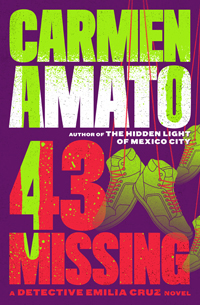
Get 43 MISSING on Amazon. Read for free with Kindle Unlimited.
Style
Being an analyst meant writing in a disciplined style and specific formats, including for the Presidential Daily Brief, which David Priess wrote all about in THE PRESIDENT’S BOOK OF SECRETS: The Untold Story of Intelligence Briefings to America’s Presidents. A bit of an academic tome, but with great historical vignettes.
I have to credit one of my first bosses with teaching me how to write. As opposed to academic writing, which usually follows a fact-fact-fact-conclusion format, intelligence publications—for readers who are perpetually pressed for time, like the Secretary of State–follow a key-judgments-fact-fact-fact format. I was fresh out of grad school, buoyed by my Master’s thesis and successful defense of it at a major academic conference. Switching my mindset was tough. I will always remember Jerry, who was partial to plaid sport coats and running around the office in his socks, taking the time to coach me.
Now as a mystery and thriller author, I really appreciate how being a CIA analyst forced me to become a disciplined writer. I learned how to construct an argument and create useful outlines. There was no waiting for the “muse” to strike before getting down to work.
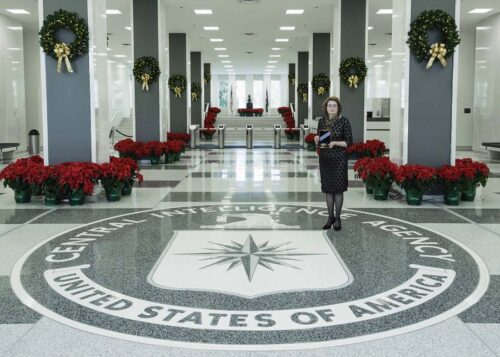
At CIA Headquarters, with my Career Intelligence Medal, November 2016
But that fact-fact-fact drumbeat has proven hard to shake. I may be writing fiction now, but often find it a struggle to be humorous, use pop culture references, or drop qualifiers like “almost certainly.”
But I’m almost certainly trying.
2 Comments
You may also like
The Perfect Library Made by the Perfectionists of Oneida, NY
If you are traveling to Oneida, NY, as I did last month, your choices for places to stay are...
Book Review: THE BONE RECORDS by Rich Zahradnik
THE BONE RECORDS by Rich Zahradnik is a wonderfully edgy “everyman” thriller but don’t expect a...
Large print edition of the Galliano Club historical fiction thriller series
New! Large print has arrived at the Galliano Club, where trouble is always on tap. Large print...
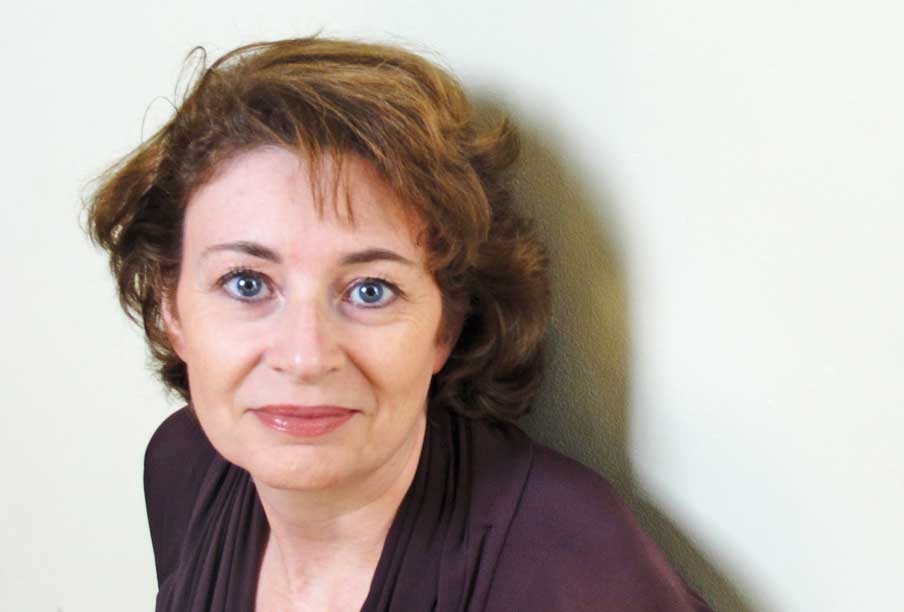
CARMEN AMATO
Mystery and thriller author. Retired Central Intelligence Agency intel officer. Dog mom to Hazel and Dutch. Recovering Italian handbag addict.

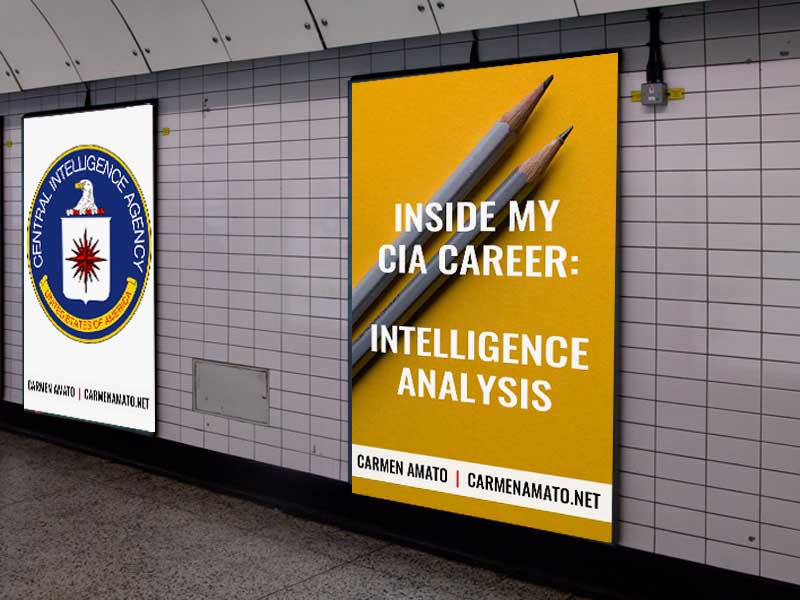

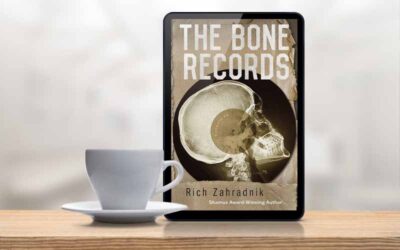
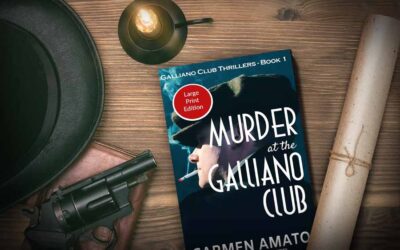

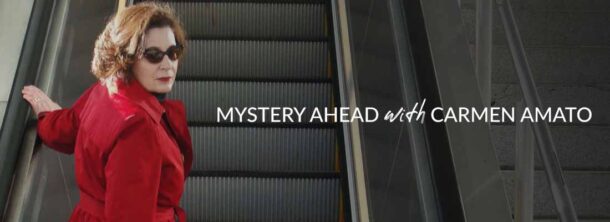
I can picture it, now that you mention it. The roads we take as writers is varied. I am almost certainly sure, that you are one of my all-time favorite authors…:)
Thank you. Coming from someone with your experience, that is high praise indeed.